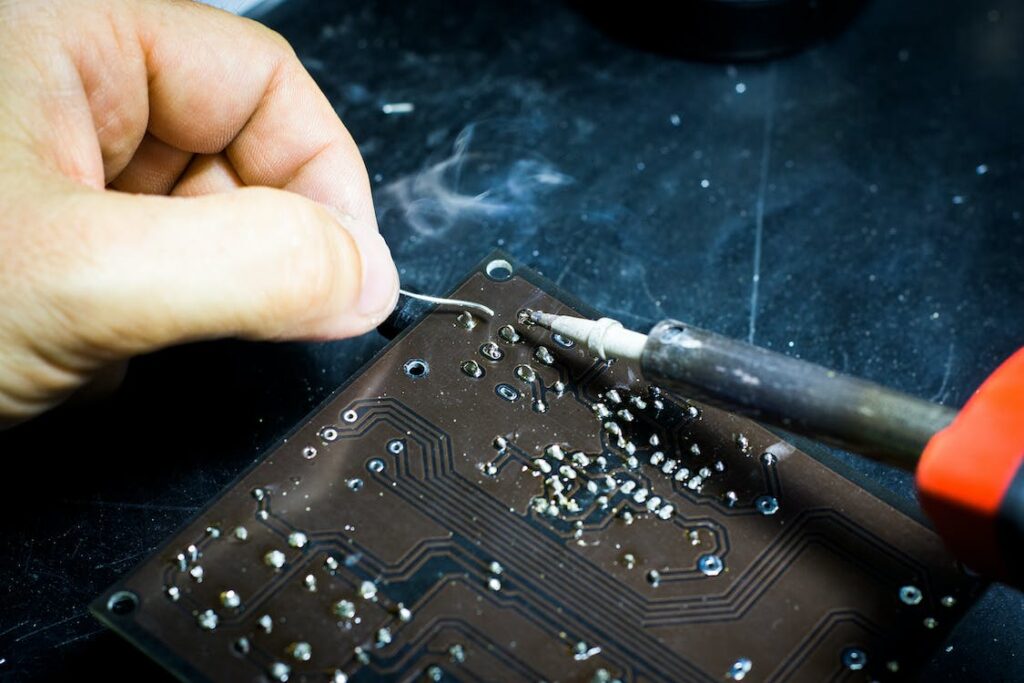The Role Of Artificial Intelligence In Electronics Manufacturing

In the whirlwind of technological advancement, no industry remains untouched by the digital revolution, and electronics manufacturing sits at the epicenter of this change. Artificial Intelligence (AI), with its capability to mimic human cognitive functions, is leading the charge in redefining traditional production landscapes. By optimizing operations, enhancing quality, and driving innovation, AI’s role in electronics manufacturing is not just beneficial but increasingly essential for staying competitive.
Below, we explore the multifaceted contributions of AI in this sector, shedding light on why industry leaders are rapidly embracing this intelligent technology.
Predictive Maintenance And Minimizing Downtime
Imagine understanding your machinery well enough to predict failures before they cause downtime. AI makes this a reality through predictive maintenance. Machine learning algorithms analyze data from equipment, detecting anomalies and signs of wear or impending failure that are imperceptible to human operators. This foresight allows for timely intervention, minimizing costly downtime and prolonging machinery life.
According to experts like Artem Moroz, scientist at the National Technical University of Ukraine Kyiv Polytechnic Institute, AI plays a significant role in predictive analytics. In an industry where precision and reliability are crucial, AI’s ability to foresee and prevent system disruptions is invaluable.
The resulting consistency in production not only saves time and resources but also fortifies a company’s reputation for reliability. The electronics manufacturing sector, known for its intricate processes, benefits immensely from this aspect of AI, maintaining a smooth, uninterrupted production line.
Quality Assurance Enhanced by Machine Precision
The precision required in electronics manufacturing is unparalleled. With components becoming increasingly minute and complex, the margin for error is slim. Traditional quality assurance methods can’t keep up with the meticulous inspection needed without substantial time and labor investments.
Enter AI, with machine vision systems that revolutionize quality control. These systems utilize cameras and AI algorithms to inspect products at a speed and accuracy level humans can’t match. By learning from images of ‘perfect’ products, they identify anomalies and defects in real time, ensuring only goods meeting strict quality standards pass through the production line. This heightened precision reduces recalls and enhances overall customer satisfaction with the end product.
Supply Chain Optimization
The complexity of managing a global supply chain is a significant hurdle in electronics manufacturing. AI enhances supply chain logistics by forecasting demand, optimizing inventory levels, and identifying the most cost-effective suppliers and shipping routes.
Through machine learning, systems analyze historical market trends, seasonal demand, and global economic indicators, making astute predictions about future product demand. This insight helps manufacturers efficiently plan production, manage inventory, and reduce carrying costs. Moreover, AI can track real-time events like weather changes or political unrest, adjusting logistics dynamically to avoid supply chain disruptions.
Customization And Personalization At Scale
In a market where consumer preferences rapidly evolve, the ability to offer personalized products efficiently sets manufacturers apart. AI drives customization in electronics manufacturing by harnessing data from customer interactions and market trends to predict consumer needs and preferences.
Manufacturers can then adapt their designs and production processes accordingly. By integrating AI into their production lines, companies can produce a wide variety of customized products without sacrificing operational efficiency, enabling them to meet specific customer needs and capture a broader market segment.
Conclusion
As we delve deeper into the digital age, the symbiosis between artificial intelligence and electronics manufacturing will continue to strengthen. The advantages are compelling — enhanced efficiency, reduced costs, improved quality, and the agility to meet market demands. However, the journey doesn’t come without challenges. Investment in new technologies, workforce reskilling, and continuous adaptation are essential components for success.
The future of electronics manufacturing with AI at its core is not just about automation but augmentation, enhancing human capabilities and bringing forth an era of unprecedented growth and innovation in the industry. The paradigm shift led by artificial intelligence is not on the distant horizon; it’s here, reshaping operations and strategies and steering the industry toward a more efficient, creative, and dynamic future. Manufacturers embracing this change will undoubtedly lead the charge into the new frontier of intelligent manufacturing.
